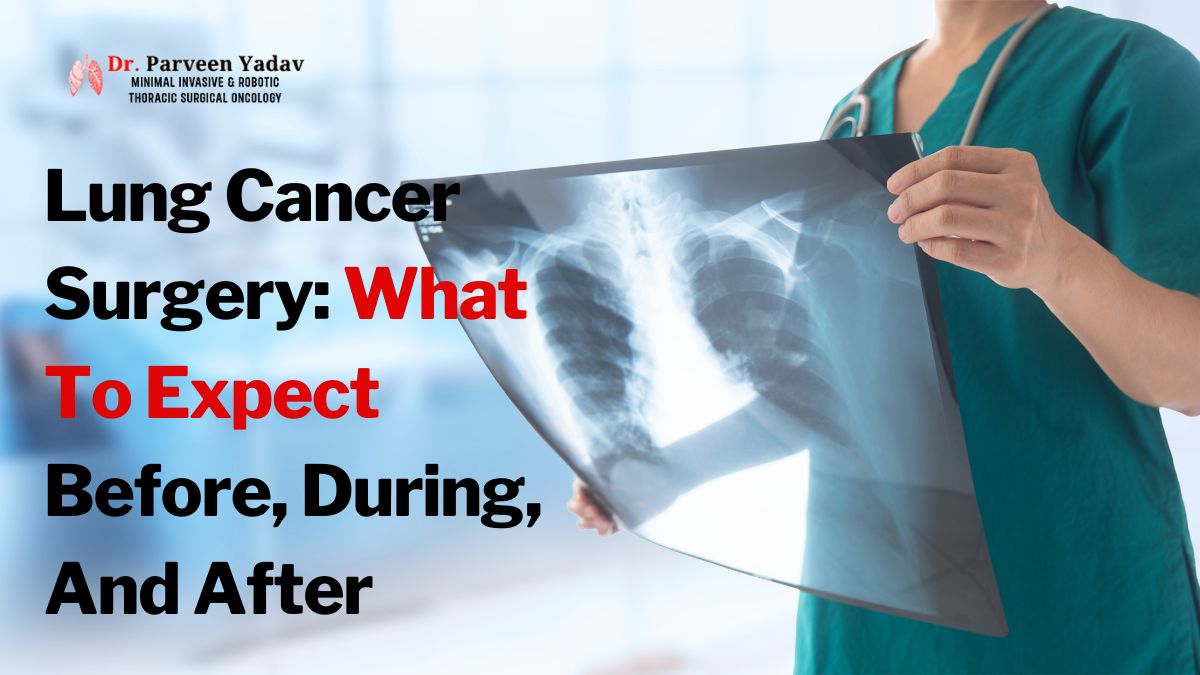

Being the most common cancer type, the danger of lung cancer looms over a large section of the global population. With seemingly trivial initial symptoms like wheezing sounds and breathing difficulties, lung cancer can have serious life-threatening implications. If you or anyone in your family has been experiencing such symptoms, make sure you seek help from a trusted doctor in your city.
For instance, if you are Delhiite, do not settle for anything less than the best lung cancer hospital in Delhi to get an issue as serious as lung cancer diagnosed and treated.
When it comes to lung cancer treatment, surgery is the most common procedure. It involves surgically removing the cancerous tumor formed due to the uncontrolled division of mutated cells in the patient’s lung tissue. If you encounter such a problem, it is important to know how to navigate through the process in an effective way.
This blog will provide you with every important detail about what to expect before, during, and after lung cancer surgery.
Preparing For Lung Cancer Surgery
Let us start by discussing a few important aspects to consider while preparing before lung cancer surgery:
Meeting The Surgical Team
You will meet with your surgical team for pre-surgical evaluation and testing. This includes a physical exam, blood tests, and imaging studies such as chest X-rays or CT scans. If you have approached the best doctor for lung cancer in Delhi, they will review your medical history, medications, and any allergies you may have. You may be asked to stop taking certain medications or supplements prior to the surgery.
Quitting Smoking
If you smoke, it is important to quit at least two weeks before the surgery. Smoking can increase the risk of complications during and after surgery, such as lung infections and delayed healing.
Optimizing Your Health
To reduce the risk of complications during and after surgery, it is important to optimize your health. This includes eating a healthy diet, staying hydrated, getting enough rest, and engaging in light exercise such as walking. If you have any chronic health conditions such as diabetes or high blood pressure, make sure they are well-controlled before the surgery.
Attending Pre-operative Counseling
Your surgeon or a member of the medical team will discuss the surgery with you and answer any questions or concerns you may have. You will also be given instructions on how to prepare for the surgery, such as not eating or drinking after midnight the night before the procedure.
Steps Involved In Lung Cancer Surgery
Once you are prepared to get under the scissor, here are the lung cancer surgery steps you should be aware of:
Once the lung cancer procedure is completed, your doctor will prepare for recovery and post-surgical care.
What Should You Expect After Lung Cancer Surgery?
Here are some of the most important aspects you should consider during the recovery phase after lung cancer surgery:
Hospital Stay
Depending on the type and extent of lung cancer surgery, you may need to stay in the hospital for several days or longer after the procedure. During this time, you will be closely monitored by your medical team, who will check your vital signs, manage any pain or discomfort, and provide instructions on how to care for yourself after discharge.
Pain and Discomfort
You are likely to experience pain and discomfort in the chest, shoulder, and back after the surgery. Your medical team will prescribe pain medication to help manage these symptoms. It is important to take the medication as directed and report any unusual symptoms or side effects to your medical team.
Breathing Exercises
After your lung cancer surgery, you may need to do breathing exercises to help prevent complications such as pneumonia and improve lung function. Your doctor and their team will provide instructions on how to perform these exercises and how often to do them.
Chest Tubes
If you had a lobectomy or pneumonectomy, you may have chest tubes inserted to drain excess fluid or air from the chest cavity. These tubes will be removed before you are discharged from the hospital.
Activity Restrictions
You will also need to avoid heavy lifting, bending, and twisting for several weeks after the surgery. Your doctor will provide the necessary instructions on when and how to resume normal activities.
Follow-up Appointments
After the surgery, you will need to attend follow-up appointments with your medical team to monitor your recovery and check for any signs of cancer recurrence. These appointments may include imaging tests such as chest X-rays or CT scans.
Emotional Support
Recovering from lung cancer surgery can be a stressful and emotional experience. Ultimately, it is important to seek emotional support from family members, friends, or a mental health professional if needed.
The Final Word
These were some of the most important aspects you should consider before, during, and after lung cancer surgery as a patient. If you have been on the receiving end of this catastrophic disease, make sure you stay strong and navigate bravely to the other side. As long as you do not give up hope, you are bound to emerge victorious after defeating the disease with all your might!

18+ Yrs Exp | 5,700+ Thoracic & Robotic Cancer Surgeries
Dr. Parveen Yadav is a Director and Senior Consultant in Thoracic and Surgical Oncology, specializing in minimally invasive and robotic lung and esophageal surgeries, with advanced training from AIIMS and Tata Memorial Hospital.
View Full ProfileDiscover how diet, breathing exercises & daily habits help prevent and recover from thoracic cancer. Expert insights from Dr. Parveen Yadav, Chest Surgery India
Discover how Da Vinci robotic surgery is transforming chest procedures in Gurgaon. Less pain, faster recovery & expert care by a certified thoracic surgeon
Just diagnosed with thoracic cancer? Learn critical first steps, biomarker testing, and what to do in the first 2 weeks from expert Dr Parveen Yadav.
Copyright 2026 © Dr .Parveen Yadav all rights reserved.
Proudly Scaled by Public Media Solution!